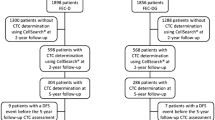Summary
PURPOSE: The prognostic relevance of circulating tumour cells (CTC) in blood of metastatic breast cancer patients was evaluated and compared with established prognostic criteria. PATIENTS AND METHODS: Blood samples from 119 breast cancer patient were examined in a retrospective analysis. For the detection of CTC in blood, a nested RT-PCR assay for mammaglobin mRNA was applied. RESULTS: In 42/119 (35%) patients CTC were detected. Patients with CTC positive blood samples at the time of diagnosis of metastases lived significantly shorter (median 18 months) than CTC-negative patients (median 51 months), suggesting that CTC serve as an additional prognostic parameter. CTC in blood were an independent prognostic parameter, associated with the highest risk of death compared to other risk factors examined (HR: 2.9). In addition, the appearance of CTC in blood of metastatic patients during treatment indicated poor prognosis. CTC-positive patients had a significantly shorter survival compared to patients remaining CTC negative during followup (p < 0.01). CONCLUSIONS: CTC at the time of diagnosis of metastases are an independent prognostic factor for overall survival. During therapy, the detection of CTC is predictive for a shorter survival of patients with metastatic breast cancer.
Similar content being viewed by others
References
Nguyen DX, Massague J. Genetic determinants of cancer metastasis. Nat Rev Genet, 8: 341–352, 2007
Watson MA, Fleming TP. Mammaglobin, a mammary-specific member of the uteroglobin gene family, is overexpressed in human breast cancer. Cancer Res, 56: 860–865, 1996
Sjoedin A, Guo D, Lund-Johansen M, et al. Secretoglobins in the human pituitary: high expression of lipophilin B and its down-regulation in pituitary adenomas. Acta Neuropathol, 109: 381–386, 2005
Carter D, Douglass JF, Cornellison CD, et al. Purification and characterization of the mammaglobin/lipophilin B complex, a promising diagnostic marker for breast cancer. Biochemistry, 41: 6714–6722, 2002
Sjödin A. Human secretoglobins in normal and neoplastic cells and tissues. http://urn.kb.se/resolve?urn=urn:nbn:se:umu:diva-490 , 2005
Sasaki E, Tsunoda N, Hatanaka Y, et al. Breast-specific expression of MGB1/mammaglobin: an examination of 480 tumors from various organs and clinicopathological analysis of MGB1-positive breast cancers. Mod Pathol, 20: 208–214, 2007
O'Brien NA, O'Donovan N, Ryan B, et al. Mammaglobin a in breast cancer: existence of multiple molecular forms. Int J Cancer, 114: 623–627, 2005
Culleton J, O'Brien N, Ryan BM, et al. Lipophilin B: a gene preferentially expressed in breast tissue and upregulated in breast cancer. Int J Cancer, 120: 1087–1092, 2007
Span PN, Waanders E, Manders P, et al. Mammaglobin is associated with low-grade, steroid receptor-positive breast tumors from postmenopausal patients, and has independent value for relapse-free survival time. J Clin Oncol, 22: 691–698, 2004
Nunez-Villar MJ, Martinez-Arribas F, Pollan M, et al. Elevated mammaglobin (h-MAM) expression in breast cancer is associated with clinical and biological features defining a less aggressive tumor phenotype. Breast Cancer Res, 5: R65–R70, 2003
Zach O, Lutz D. Tumor cell detection in peripheral blood and bone marrow. Curr Opin Oncol, 18: 48–56, 2006
Lacroix M. Significance, detection and markers of disseminated breast cancer cells. End Rel Cancer, 13: 1033–1067, 2006
Zach O, Kasparu H, Krieger O, et al. Detection of circulating mammary carcinoma cells in the peripheral blood of breast cancer patients via a nested reverse transcriptase polymerase chain reaction assay for mammaglobin mRNA. J Clin Oncol, 17: 2015–2019, 1999
Zach O, Wagner H, Kasparu H, et al. Statistical validation of the mammaglobin-nested RT-PCR assay for tumor cell detection in blood of breast cancer patients. BioTechniques, 31: 1358–1362, 2001
Schmid P, Wischnewsky M, Sezer O, et al. Prognostic factors are more important for overall survival (OS) than treatment outcome in patients with metastatic breast cancer (MBC). Ann Oncol, 11(Suppl 4): 27, 2000
Alix-Panabieres C, Müller V, Pantel K. Current status in human breast cancer micrometastasis. Curr Opin Oncol, 19: 558–563, 2007
Zach O, Lutz D. Mammaglobin remains a useful marker for the detection of breast cancer cells in peripheral blood. J Clin Oncol, 23: 3160, 2005
Bidard FC, Vincent-Salomon A, Sigal-Zafrani B, et al. Prognosis of women with stage IV breast cancer depends on detection of circulating tumor Cells rather than disseminated tumor cells. Ann Oncol, 19: 496–500, 2008
Nole F, Munzone E, Zorzino L, et al. Variation of circulating tumor cell levels during treatment of metastatic breast cancer: prognostic and therapeutic implications. Ann Oncol, 19: 891–897, 2008
McShane LM, Altman DG, Sauerbrei W, et al. Statistics Subcommittee of NCI-EORTC Working Group on Cancer Diagnostics. Reporting recommendations for tumour MARKer prognostic studies (REMARK). Breast Cancer Res Treat, 100: 229–235, 2006
Author information
Authors and Affiliations
Corresponding author
Rights and permissions
About this article
Cite this article
Zach, O., Zellhofer, B., Födermayr, M. et al. The detection of circulating tumour cells in blood of metastatic breast cancer patients is of prognostic relevance. memo 1, 281–285 (2008). https://doi.org/10.1007/s12254-008-0075-5
Received:
Accepted:
Issue Date:
DOI: https://doi.org/10.1007/s12254-008-0075-5




